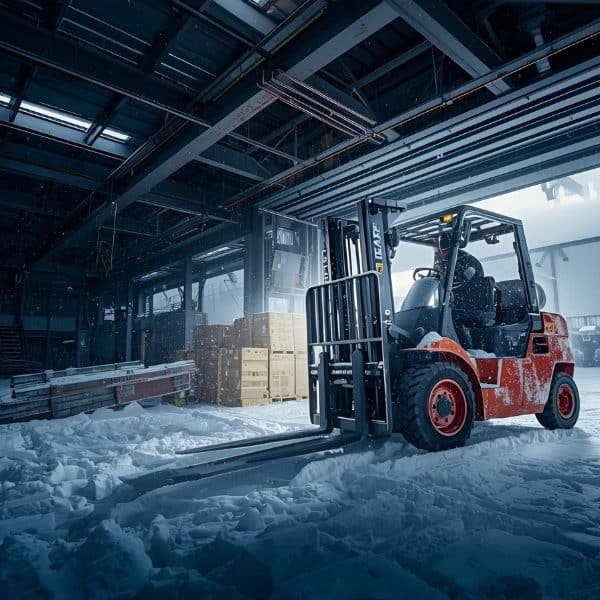Keep Your Forklifts Running Smoothly Through the Cold Months
Why Winter Maintenance Matters
Forklifts, much like any other piece of machinery, are susceptible to the rigours of winter. Lower temperatures can affect battery performance, fluids can thicken, and tyres may lose grip on icy surfaces. Neglecting winter service can lead to unexpected breakdowns, reduced efficiency, and increased risk of accidents. A proactive approach helps to extend the lifespan of your equipment and keeps your workforce safe.
Key Areas to Focus on During Winter Service
1. Battery Care – Cold weather can significantly reduce battery efficiency. Ensure batteries are fully charged at the start of each shift, and keep them clean and dry to prevent corrosion. If possible, store forklifts indoors or in covered areas to protect batteries from freezing temperatures.
2. Fluid Checks – Hydraulic fluid, engine oil, and coolant can become more viscous in colder weather, affecting performance. Check fluid levels regularly and use winter-grade lubricants as recommended by the manufacturer. Regularly inspect for leaks, as seals can contract and crack in the cold.
3. Tyre Maintenance – Tyres lose pressure more quickly in cold conditions, which can reduce traction and stability. Check tyre pressure frequently and consider switching to winter or non-marking tyres for improved grip on icy or wet surfaces.
4. Visibility and Lighting – Shorter days and poor weather mean visibility can be a challenge. Inspect all lights—headlights, tail lights, and warning beacons—and replace any bulbs that aren’t working. Clean forklift windows and mirrors regularly to maintain clear sight lines.
5. Brake and Steering System – Moisture and cold can affect brake efficiency and steering responsiveness. Test brakes and steering before each use and schedule regular inspections to ensure they are functioning correctly.
6. Operator Comfort and Safety – Operators are at their best when comfortable and warm. Ensure that cabins are free from draughts and that heaters are working if fitted. Provide operators with suitable winter clothing, including non-slip footwear and high-visibility jackets.
Practical Tips for Daily Winter Operation
• Allow engines to warm up before starting work to ensure fluids are circulating properly.
• Keep loading areas and travel paths clear of snow and ice to reduce the risk of slips and skids.
• Encourage operators to perform pre-shift inspections with extra attention to winter-specific issues.
• Consider implementing a logbook system to record daily checks and maintenance activities.

When to Call in the Professionals
While daily checks are essential, scheduling regular professional maintenance is just as important during winter. Certified technicians can perform in-depth inspections, adjust components for winter conditions, and spot potential problems before they lead to costly downtime. Don’t wait until a breakdown occurs—proactive servicing is the key to a trouble-free winter season.
Winter doesn’t have to bring your forklift operations to a halt. By prioritising maintenance, checking key components, and ensuring your operators are prepared, you can keep your forklifts running safely and efficiently all season long. Stay ahead of the cold, and let your business thrive—whatever the weather brings.
If you need a service or winter attachments call Kent Pallet Trucks today!
